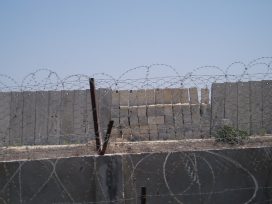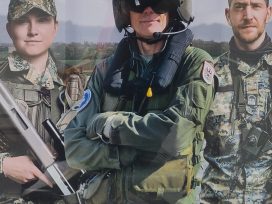The world teeters on the brink of an unprecedented global catastrophe: wars rage across continents; economic instability looms large; and human rights – once hailed as the bedrock of international law – appear increasingly fragile. Humanity seems to be living in a macabre reenactment of Schrödinger’s Cat. In the famous quantum mechanics thought experiment, a cat, sealed inside a box with a radioactive atom, a Geiger counter and a vial of poison, is considered both alive and dead, existing in a paradoxical state until the box is opened. The cat’s fate hinges on the radioactive atom, its condition held in a quantum superposition, both decayed and not decayed, until observed and collapsing into one definite state.
Similarly, human rights often exist in a state of superposition: they hang in the balance until duly noted. Sometimes they are defended by an ‘international community’, but too often a blind eye is turned. Consequently, the system is accused of vigorously applying double standards.
War in Europe for third year
Following the annexation of Crimea in 2014, Russia’s full-scale invasion of Ukraine in 2022, now in its third year, has incurred massive casualties, widespread environmental and structural destruction, serious war crimes and crimes against humanity. What started as a one-side invasion of Ukrainian territory has evolved into an intense two-side struggle. In August 2024 Ukraine stepped up its small-scale manoeuvres into western Russia and invaded Kursk, taking over 1,150 square kilometres of Russian territory, displacing the local population. But millions of Ukrainians have become refugees since the war escalated. And hundreds of thousands of Russians, who fled Putin’s regime, are living in exile. Tens of thousands of lives have been lost.
The right to sovereignty, self-determination, and the protection of civilians and the environment in wartime – all enshrined in international law – have collapsed. They are being treated as optional, dispensable in the pursuit of power and territorial gain. Russia’s destruction of the Kakhovka Dam and repeated shelling near the Zaporizhzhia Power Station, Europe’s largest nuclear facility, underscore the devastating environmental impact of modern warfare. These actions serve as a grim reminder: while human rights and environmental protections may exist in theory they are often sacrificed on the altar of geopolitical strategy, their reality dependent on the shifting tides of war.
Escalation in Middle East
On 7 October 2023, Hamas launched a terrorist attack on Israel, killing over 1,400 civilians and soldiers, and taking 251 hostages. Israel has since carried out extensive airstrikes on Gaza, targeting Hamas but simultaneously causing widespread civilian casualties and devastating essential infrastructure, deepening the humanitarian crisis. The conflict has led to large-scale destruction, drawing significant international scrutiny toward both parties.
Tensions in the Middle East have escalated with multiple Israeli assassinations of Hezbollah and Hamas leaders in Gaza, Syria, Lebanon and Iran, notably followed by Iranian retaliation attacks. As Israel continues its military operations against Gaza, the explosive incidents have destabilized Lebanon, intensifying fears of broader regional conflict.
The relentless bombardment of Gaza has led to a catastrophic loss of life, with estimates of Palestinian deaths varying widely due to inconsistent and politicized reporting. While mainstream outlets report the death toll to be over 42,000, medical journals estimate that after eleven months of daily bombardments ‘up to 186,000 or even more deaths could be attributable to the current conflict in Gaza’. This disparity in reported figures highlights a disturbing trend in media coverage, where the true scale of the tragedy is underreported or misrepresented, leading to a dangerous normalization of violence.
Furthermore, reports of severe human rights abuses, including torture and rape of Palestinian prisoners, continue to surface, adding to the already dire situation. These abuses, documented by credible sources, illustrate the depths of human suffering that are often overlooked in the broader geopolitical narrative. Even the fundamental right to be counted and remembered is denied many, as the world turns a blind eye to the mounting casualties and the everyday atrocities that define life in the occupied territories.

US Air Forces Central loadmasters watch as humanitarian aid is airdropped from an Air Mobility Command C-17 Globemaster III over Gaza, 21 March 2024. Image by US Air Force via Wikimedia Commons
The right to peace, security and economic stability – rights that are fundamental to human dignity – are increasingly elusive in a world where the machinery of war grinds on, indifferent to the suffering it causes. The failure to accurately report and respond to these horrors further underscores the fragility and selective application of human rights.
Latin America’s crisis
Violence, fuelled by drug cartels and criminal organizations, has become a pervasive force across Latin America. From 2014 to 2024, the continent has witnessed an extraordinary number of deaths directly linked to illicit activities. This crisis exemplifies the broader challenge of ensuring human rights protection in regions where state authority is undermined by non-state actors.
In Mexico, where the past decade has been particularly brutal, over 160,000 lives have been claimed by drug-related violence. More than 34,000 homicides were reported in 2019 alone. A significant portion of these deaths were connected to the bloody battles between major criminal organizations such as the Sinaloa Cartel and the Jalisco New Generation Cartel. These groups, locked in a relentless struggle for control over lucrative drug trafficking routes, have turned parts of the country into war zones, where innocent civilians are often caught in the crossfire.
The situation in Colombia mirrors this grim reality. Although the demobilization of the Revolutionary Armed Forces of Colombia (FARC) brought hope for peace in 2017, it also created a power vacuum in rural areas. When other criminal groups moved in to control the drug trade, a resurgence of violence occurred. Thousands of Colombians have died in this renewed conflict, driven by an ongoing demand for cocaine and other illicit drugs both within and beyond the region. This scenario highlights the limitations of transitional justice mechanisms and the complexities of addressing human rights violations in post-conflict societies.
As lawyer Naomi Roht-Arriaza, an expert on post-conflict in Latin America, points out, ‘the call for “transformative” justice arises in part from frustration on several counts with actually existing transitional justice. Critics noted that despite a wealth of transitional justice measures, the everyday lives of the majority in the countries involved had changed little or even worsened.’ This underscores the need for more transformative approaches that go beyond traditional transitional justice methods to address the root causes of inequality and systemic injustice.
The violence associated with organized crime has also reached alarming levels in Brazil. In urban areas such as Rio de Janeiro, drug-related violence has led to tens of thousands of deaths over the past decade. Central American nations, including Honduras, El Salvador and Guatemala, have similarly been ravaged by violence. These countries, situated along key drug trafficking routes, now suffer from some of the highest homicide rates in the world. In El Salvador alone, the homicide rate in 2015 exceeded 100 cases per 100,000 people, largely due to drug trade and gang violence.
Estimates suggest that over tens of thousands of people have lost their lives due to drug cartel and organized criminal violence over recent decades in Latin America. This staggering death toll underscores the profound humanitarian crisis facing the region. Despite this, the international community has largely failed to provide adequate support to curb the violence or address its root causes, leaving affected populations to endure the ongoing consequences. As law professor Philip Alston emphasizes, international cooperation and stronger enforcement mechanisms to protect human rights have critical roles in such contexts.
The impact of this violence extends beyond the immediate loss of life. It contributes to widespread instability, undermines governance, and perpetuates a cycle of poverty and despair in communities across the region. Human rights in Latin America are in a state of profound crisis, where the basic right to life, security and justice is under constant threat. The global community’s failure to effectively address these issues only deepens the sense of injustice and impunity that pervades the region.
War in Sudan and Myanmar
Civil war in Sudan, which began during Ramadan 2023, continues to wreak havoc with no end in sight. The conflict has displaced millions and incurred thousands of casualties, including mass killings, sexual violence and the destruction of entire communities. The promise of human rights in this region has been replaced by a daily struggle for survival, where the most basic rights to life, dignity and security are violated with impunity.
Similarly, in Myanmar, where the Rohingya crisis once shocked the world, human rights abuses have only worsened. Reports in 2024 indicate that the persecution of ethnic minorities and political dissidents has intensified, with the military junta ruling through fear and violence. The international community’s response has been inadequate at best, highlighting the stark gap between the ideal of human rights and their implementation.
Persecution in Afghanistan
Human rights violations, particularly against women and girls, have become systematic and widespread under Taliban rule in Afghanistan. Over the past three years, the Taliban has entrenched a system of institutionalized gender oppression, issuing over 80 edicts that specifically target and restrict the rights of women and girls. This deliberate subjugation has been described by many as ‘gender apartheid’. The Taliban’s flagrant disregard for the principles of justice, non-discrimination and the rule of law is a stark example of how human rights, while theoretically upheld by international norms, can be utterly disregarded in practice.
The plight of religious and ethnic minorities, children, people with disabilities, and other vulnerable groups in Afghanistan highlights the grave consequences of inaction. Arbitrary arrests, unlawful killings and torture are commonplace. The withdrawal of humanitarian aid, while necessary to avoid bolstering the Taliban’s authority, threatens to plunge the country into deeper despair. Further abandonment of the Afghan people must be avoided.
International criminal law and accountability
The paradox of human rights in 2024 is further complicated by the state of international criminal law. While significant advancements have been made in holding perpetrators of atrocities accountable, there are still glaring weaknesses in the system. For instance, Article 124 of the Rome Statute of the International Criminal Court (ICCRSt), which allows states to opt-out of war crimes jurisdiction for seven years, undermines the universality and effectiveness of the International Criminal Court (ICC). This reservation casts a shadow over the progress made in international criminal law, reflecting the broader tension between the advancement of legal norms and the political realities that hinder their full application.
The use of Article 124 by states seeking to shield themselves from accountability exemplifies the selective nature of justice in the international system. This exposes contradictions within the global human rights regime, where legal frameworks exist but are often circumvented by those in power. Human rights are left in a state of uncertainty, where their fate depends on whether the international community chooses to face them or not. Yet too often, the world remains passive, avoiding the responsibility to observe and confront these violations, allowing the uncertainty to persist unchecked.
A philosophical lens
In the context of these global crises, Schrödinger’s Cat offers a powerful metaphor for the current state of human rights. On the one hand, they are enshrined in international law, invoked in diplomatic discourse and championed by activists around the globe. They are alive in the sense that they continue to serve as a guiding principle for the international community, a standard against which the actions of states and non-state actors are measured. Yet, in practice, human rights are dead in many parts of the world, where war, violence, oppression and injustice prevail.
The existence of human rights, much like Schrödinger’s Cat, resides in a paradox where both their protection and violation coexist until the global community chooses to observe and intervene. It is not merely the act of looking but also the decision to act that will collapse this uncertainty. The international response – or lack thereof – to the crises in Ukraine, Palestine, Latin America, Sudan, Myanmar, Afghanistan and beyond will shape the future of human rights. Whether they are upheld or quietly erode into nothingness depends on the global community’s courage to actively engage and address these violations.
Bridging the gap between theory and practice
This duality – the simultaneous existence and non-existence of human rights – presents a profound challenge for the international community. It calls into question the effectiveness of the current human rights framework and demands a reassessment of our collective approach to protecting and promoting human dignity. As we stand on the brink of a potential global catastrophe, it is imperative that we confront this paradox head-on. The international community must move beyond rhetoric and take concrete action to ensure that human rights are not merely theoretical constructs but are realized in the lives of all people, regardless of where they live.
The world must recognize that human rights, much like Schrödinger’s Cat, may be in an uncertain state when unobserved, but when we choose to confront them, we cannot shy away from reality. It is our responsibility to actively defend and promote them. This requires a renewed commitment to international cooperation, a willingness to hold violators accountable, and an understanding of the profound connections between global security, economic stability and human dignity. In the face of overwhelming challenges, the international community must summon the courage to look, confront the consequences of inaction and ensure that human rights do not fade into obscurity through neglect.
The analogy of Schrödinger’s Cat serves as a poignant reminder of the precarious state of human rights in 2024. We live in a world where they exist in a state of uncertainty: alive in principle but often dead in practice. It is up to us – nations, institutions and individuals alike – to observe, act and strive with all our abilities to ensure that the promise of human rights is fulfilled – not just in theory but also in reality.
An early version of this article was delivered as a speech at an International Documentary Festival, Ierapetra, Greece.







